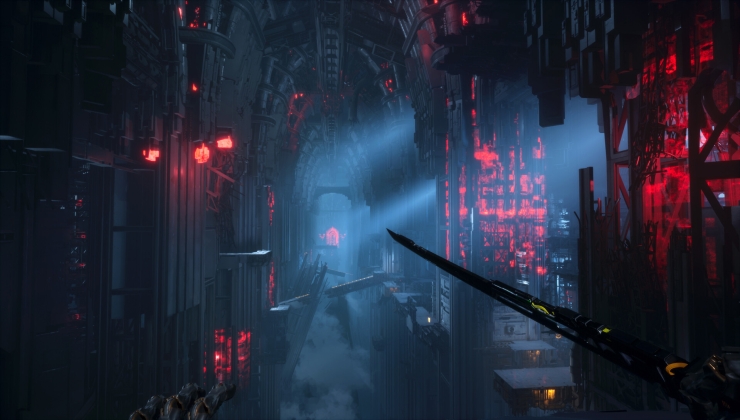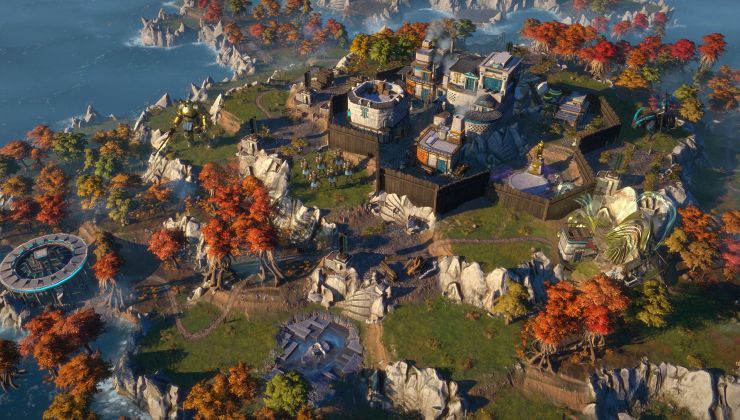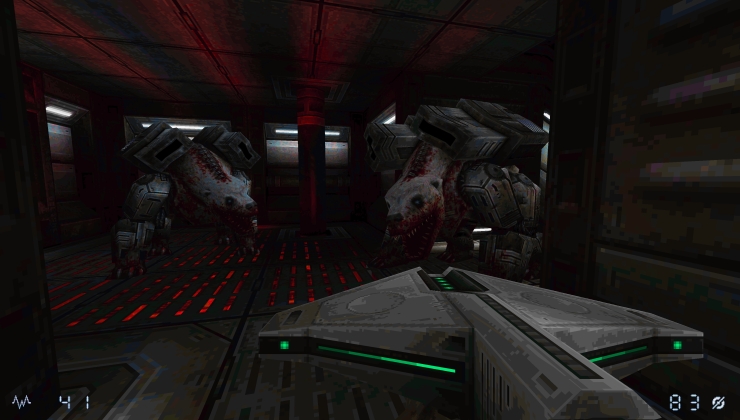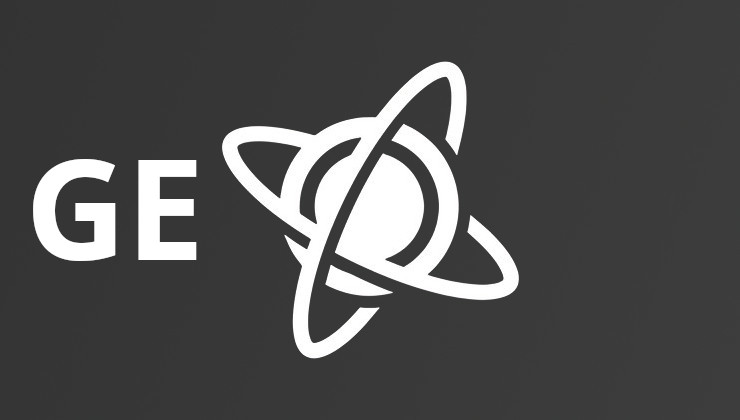Frozenbyte being the developer behind titles like the Trine series, Shadwen, Has-Been Heroes and the upcoming Starbase talks a little about Proton and future native Linux support. If you're not clear on what Proton and Steam Play are, be sure to check out our constantly updated dedicated page. It's a special compatibility layer for running Windows games and apps from Steam on Linux.
If you're not aware, Frozenbyte did previously have their games ported over to Linux but they eventually stopped after the release of Shadwen in 2016. The latest Trine 4 and their other titles don't have Linux version. With Starbase that's due to release tomorrow (July 29, 2021), there's a post on the Steam forum from a user asking about Linux support and Frozenbyte developer Jukka Larja (JLarja) replied on July 27 to explain it's not a priority:
With Proton being as good as it is, native support is not very high on our list. In fact (without actually trying the native versions on modern Linux distro) I would recommend Proton emulation over native versions for all the previous games we've released. Changes are you'll get better graphics quality, likely less trouble getting the game running and input working, and possible better performance too. For low-on-resources port Proton is simply superior.
If Linux gaming takes off (for example, because Steam Deck becomes a huge success), then we'll have a reason to consider not-so-low-on-resources port, which may (and probably does) change the picture somewhat. At the moment we have Xbox Series X/S higher on our porting targets list though (not for Starbase currently, but for other future projects).
I imagine there will be plenty more of this, especially for older ports where performance wasn't top and some that might have other issues. Proton isn't just something that's good to ensure Linux gamers and Steam Deck users get to play the latest games, it's also (as even porter Ethan Lee has pointed out), good for being an "essential preservation project" for older Windows games to keep them working nicely.
What is interesting to see is a mention of it being possibility if the Steam Deck is a success. People will argue on one side about there not being a point if Proton gets to the stage where Windows games can just run out of the box on Linux with Proton, but there is the other side that a native Linux build gives developers more control and flexibility on their games compared with handing it all over to Valve. Either way, that and more depends on how the Steam Deck goes.
That begs the question, why?Due to it being streaming, it's super sensitive to anything especially anything that might cause a bit more input lag.
Not to be a nitpicker but just to be totally clear: Do we know this, as in that it is confirmed, or is this an assumption/possible explanation?
I mean, it's great if it's true, don't get me wrong, I just find it a bit hard to understand. The additional input lag on server side, with the powers to handle that additional overhead, should by my logic be barely possible to even measure?
German gaming news mag Gamestar has just updated an article with a direct response by Valve (PR),
which states that Steam Deck will support the entire Steam library (more or less).
Link to the article:
https://www.gamestar.de/artikel/valve-steam-deck-kompatible-spiele,3371994.html
The comment with the original statement in English
https://www.gamestar.de/artikel/valve-steam-deck-kompatible-spiele,3371994,kommentar5539666.html
"Steam Deck is built to support the entire Steam Library. Some games may run better than others in the same ways in which some games play better with controllers than others. That said, many games won’t require added work from game developers to run well on Deck because of Proton, and we’re spending the time between now and launch working with devs on additional ways to optimize for Deck where needed."
That begs the question, why?Due to it being streaming, it's super sensitive to anything especially anything that might cause a bit more input lag.
Not to be a nitpicker but just to be totally clear: Do we know this, as in that it is confirmed, or is this an assumption/possible explanation?
I mean, it's great if it's true, don't get me wrong, I just find it a bit hard to understand. The additional input lag on server side, with the powers to handle that additional overhead, should by my logic be barely possible to even measure?
Honestly, if you feel so adamant that there are games running on a runtime translation layer (Proton/Wine) on Stadia, look one up! Email the question to Google/Stadia directly or even a few of the developers who've ported their games to Stadia. If the feels are there for you that we don't know that there aren't any games on Stadia running through Proton (etc)... find one and sooth those feelings.
Honestly, if you feel so adamant that there are games running on a runtime translation layer (Proton/Wine) on Stadia, look one up! Email the question to Google/Stadia directly or even a few of the developers who've ported their games to Stadia. If the feels are there for you that we don't know that there aren't any games on Stadia running through Proton (etc)... find one and sooth those feelings.
I'm not adamant, I just seek to separate facts from assumptions (as we all should, really!).
Like I say, I struggle to see the logic in it. But of course, that is nothing but an assumption on my behalf too, based on my limited insights.
So I simply ask, do we know this? Or do we assume this based on the little we do know? That's what I try to get to the bottom of here. Not to discredit anyone, but too often assumptions gets repeated and establish themselves as "truths" without anyone actually knowing.
But if none of us here actually knows this (and even have a link to support it!), then yeah it's a good idea to send an email to someone inside and ask, absolutely!
So I simply ask, do we know this? Or do we assume this based on the little we do know? That's what I try to get to the bottom of here. Not to discredit anyone, but too often assumptions gets repeated and establish themselves as "truths" without anyone actually knowing.I assume they deliver wine wrapped binaries like porting used to be.
Hmmm, maybe it's like this: the less CPU and GPU your game uses, the less % google will take from your income.
Now *that's* an incentive.
https://stadia.google.com/games
Scroll down to the store titles. Do anyone honestly believe that all those titles are really fully ported to Linux? Seriously? Look at that list.
Maybe a custom library or three are added just to add an API to the controllers or something, maybe, but honestly: It simply doesn't add up for me. There has to be a layer of some sort, with the vast majority of the code running being the original windows binaries.
Last edited by Beamboom on 29 Jul 2021 at 12:32 pm UTC
... And just to add to this, if we look at the available games on Stadia today:
https://stadia.google.com/games
Scroll down to the store titles. Do anyone honestly believe that all those titles are really fully ported to Linux? Seriously? Look at that list.
Maybe a custom library or three are added just to add an API to the controllers or something, maybe, but honestly: It simply doesn't add up for me. There has to be a layer of some sort, with the vast majority of the code running being the original windows binaries.
Yes, all of those got ported to Stadia.
If you want i can throw Doom 2016 Stadia port experiences video from id Software dev, comments from Durante ( PC porter that was previously a well famed modder, also does Stadia ports )on Reddit about his Stadia ports and Stadia port requirements , Bungie's Destiny 2 Stadia port experiences video, Ubisoft's Ac Odyssey Stadia port experiences video.
Why those games ported to Stadia and why they don't see daylight for Linux desktop?
- Google pays small fortunes to get those ports on their platform.
- Supporting Stadia as a platform is lot easier than supporting desktop Linux; one driver, one set of hardware, no user input/choice that can cause different behaviour between instances. It is essentially a console but on cloud.
-While in house ports does exists and if they are confident about their Vulkan work it ends up in PC build ( such as Rockstar's RDR2,Vulkan is default api for RDR2 on PC) ; most of those ports were outsourced to porting houses such as QLOC ( Ported Cyberpunk 2077 to Stadia ) with basically zero tests being done on actual PC hw combinations. So neither build itself or VLK backend itself won't end up on PC for such cases.
PS: DXVK-native is also being used for some Stadia ports. Just like how Portal 2, Left 4 Dead 2 Linux ports are using DXVK-native. DXVK-native is meant for usage as a native library. Just name containing DXVK doesn't make it not native.
Stadia doesn't use Wine/doesn't rely on Wine.
Why those games ported to Stadia and why they don't see daylight for Linux desktop?
Thanks a lot, Leopard!
Amazing. That gotta cost'em a fortune!
Anyway, they were among the first to jump the Humble Linux train that got everything started and I'll never forget that. Linux gaming today only exists because of some critical events and the HIBs were a key part of this.
Trine 2 was the first game I bought for Linux.
Anyway, they were among the first to jump the Humble Linux train that got everything started and I'll never forget that. Linux gaming today only exists because of some critical events and the HIBs were a key part of this.
Trine 2 was the first game I bought for Linux.
Yep... Sitting on my couch, my Inspiron N5110 on my lap. Still remember that moment. Good'ol times, when everything felt new!
Anyway, they were among the first to jump the Humble Linux train that got everything started and I'll never forget that. Linux gaming today only exists because of some critical events and the HIBs were a key part of this.
Trine 2 was the first game I bought for Linux.
Yep... Sitting on my couch, my Inspiron N5110 on my lap. Still remember that moment. Good'ol times, when everything felt new!
It didn't start up at first, all just black, and I wasn't even disappointed, I felt like it had to be like this, 'cause, you know... it's Linux, it cannot be for gaming!
Anyway, they were among the first to jump the Humble Linux train that got everything started and I'll never forget that. Linux gaming today only exists because of some critical events and the HIBs were a key part of this.
Trine 2 was the first game I bought for Linux.
Yep... Sitting on my couch, my Inspiron N5110 on my lap. Still remember that moment. Good'ol times, when everything felt new!
It didn't start up at first, all just black, and I wasn't even disappointed, I felt like it had to be like this, 'cause, you know... it's Linux, it cannot be for gaming!
My Inspiron had a Radeon HD6470m with 512mb VRAM... Considering the driver support for AMD products, back then... The input lag made the game barely playable... But I kept on gaming, because "It's on Linux and Steam is in beta".
Last edited by Mohandevir on 29 Jul 2021 at 6:33 pm UTC
and this is a paradox.
more the proton and vulkan is more the marketshare and more native games for Linux. Because native with vulkan is more easy than praying a 3rd party solution will works for our product.
Proton solves most all the Linux related issues. No need to hire Linux game developers or teach your current Windows/DirectX-only developers Linux and OpenGL/Vulkan. But Proton is still a different platform that requires its own QA and support pipeline. I bet that if the Steam Deck is a success, developers will have a dedicated QA for the Deck. When games do not run well on Proton, the current usual answer is "we don't care". But if the Deck is a success, this answer will probably not be acceptable anymore.
So Frozenbyte, you're wrong. Proton is indeed the way to go for Linux gaming. If I remember correctly, you stopped porting on Linux because of the costs. I perfectly understand and accept that. The cost of doing a native port won't change so if the Deck is a success and you want your games to run well on it, test your windows build with the Deck and modify your windows build when it breaks Proton. But what you will probably not do if the Deck is a success is telling Deck users "we don't care" like you just told us.
Proton is better than half-assed ports. I'm looking at you Total War Warhammer II :<
Hm, I'm playing native version of TW: Warhammer 2 (around 200 hours) and besides the non available cross-platform multiplayer I didn't found any issue with it.
On other games (Valheim in example), the Linux port is so bad performance whise (OGL and Vulkan) that it's actually better to play using Proton,
In case of Valheim I notice this too, and the cause is not Vulkan being worse than Directx, but probably because the developers are more comfortable at working with dx,
Well, I didn't mean Vulkan is worse as an API, but the implementation in Valheim seems less polished than the DX version. And rightfully so, it's early access and Vulkan implementation quite new in their engine. They are leaning Vulkan being their main implementation in future, but they are not there yet, that will require some more work / polishing.
And as an API, Vulkan may be lower level and require more effort by devs, but as we see in DXVK, it can work, and work nicely.
Well, I didn't mean Vulkan is worse as an API, but the implementation in Valheim seems less polished than the DX version.I know, I was just reinforcing my point :)
but performance depends on many things i have only 10 fps loss in valheim with full desktop effect KDE. But 10 fps more with windows 10 with no desktop effect. what if i use xfce on linux ?
Proton is better than half-assed ports. I'm looking at you Total War Warhammer II :<
Curious, what do you find so bad about that port?
Performance is worse than running it with Proton and WAY worse than running it on Windows (3900x + 1080ti). Delayed patches and no multiplayer with Windows. It's a joke











 How to install GE-Proton on Steam Deck, SteamOS, Linux
How to install GE-Proton on Steam Deck, SteamOS, Linux
See more from me